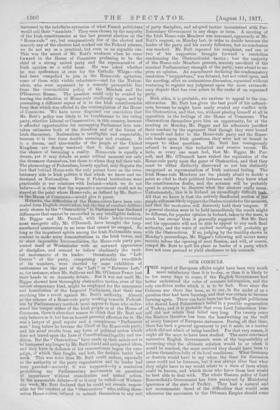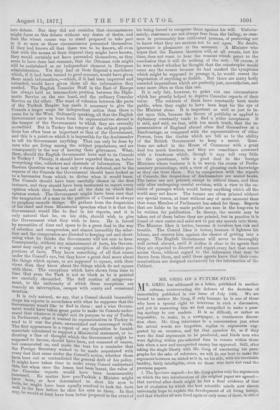OUR CONSULS.
THE aspect of European affairs might have been very much more satisfactory than it is to-day, or than it is likely to be for many days to come, if the English Government had better understood the value of accurate information, and the only condition under which it is to be had. Ever since the Crimean war there has been, so to say, in the midst of us a question that had been burning, and that was certain to become burning again. There can have been but few English politicians who shared Lord Palmerston's belief in a possible regeneration of Turkey, and it is probable that even Lord Palmerston him- self did not retain that belief very long. For twenty years the Eastern Question has been the handwriting on the wall at every banquet of European statesmen, During all that time, there has been a general agreement to put it aside, as a matter which did not admit of being handled. For that very reason, it ought all the more to have been studied. The more convinced successive English Governments were of the impossibility of foreseeing what the ultimate solution would be or when it would be reached, the more resolved they should have been to inform themselves fully of its local conditions. What Germany or Austria would have to say when the time for discussion came could not be foreseen, but it was always clear that what they might have to say would relate to a state of facts which could be known, and which those who knew them best would be best able to deal with, The whole Eastern policy of Lord Beaconsfield's Government has been paralysed by Ministerial ignorance of the state of Turkey. They had a natural and not unreasonable dread of the difficulties that would arise whenever the succession to the Ottoman Empire should come into debate. But they did not consider that circumstances might force on this debate without any desire of theirs, and that the wisest course was to stand prepared to take part in it so soon as those circumstances presented themselves. If they had known all that there was to be known, all even that with the means at their disposal they might have known, they would certainly not have persuaded themselves, as they seem to have done last summer, that the Ottoman rule might still be maintained as an independent element in European administration. Yet they had at their disposal a machinery which, if it had been turned to good account, would have given them much information,—which, if it had been improved and extended, would have given them all the information they needed. The English Consular Staff in the East of Europe has always held an intermediate position between the Diplo- matic Service on the one hand, and the ordinary Consular Service on the other. The want of cohesion between the parts of the Turkish Empire has made it necessary to give the Consuls a larger scope for independent action than there is room for in the West. Ordinarily speaking, all that the English Government cares to learn from its representatives abroad is the temper of the Governments to which they are severally accredited. But in Turkey the temper of the subject popula- tions has often been as important as that of the Government, and this is a point on which it is impossible for the Ambassador to tell his Government anything. That can only be done by men who are living among the subject populations, and are consequently in the way of hearing their grievances. What, then, should the English Government have said to its Consuls in Turkey ? Plainly, it should have regarded them as, before everything else, collectors and channels of information. The Eastern Question was at best only a storm deferred, and to the reports of the Consuls the Government should have looked as to a barometer from which to divine when it would burst. The Consuls should have been carefully chosen in the first instance, and they should have been instructed to report every opinion which they formed, and all the data on which that Opinion rested. The Government might have been sure that the temptation of a man in the position of a Consul is always to prophesy smooth things. He gathers from the despatches of his chief and from Ministerial speeches what it is that the Government would like to find in his reports, and it is only natural that he, on his side, should wish to give the Government what they wish to have. He is forced by necessities of time and space to do a great deal in the way of selection and compression, and almost insensibly the selec- tion and the compression are directed to keeping out and short- ening what he thinks the Government will not care to hear. Consequently, without any misstatement of facts, his Govern- ment may easily get a wrong conception of the relative pro- portions of facts. They know something of all that comes under the Consul's eye, but they know a great deal more about the things which square, or are supposed to square, with their views than they know about the things which do not square with them. The exceptions which have shown from time to time that even the Turk is not so black as he is painted are carefully chronicled. The dull routine of misgovern- ment, to the uniformity of which these exceptions are scarcely an interruption, escapes with scanty and occasional mention.
It is only natural, we say, that a Consul should insensibly shape his reports in accordance with what he supposes that the Government would like to find in them ; and a wise Govern- ment would have taken great pains to make its Consuls under- stand that whatever it might suit its purpose to say of Turkey in Parliament, what it wanted its representatives in Turkey to send to it was the plain, unvarnished and unarranged truth. The first appearance in a report of any disposition to furnish materials calculated to support a Ministerial statement, or in- dicating a line of thought which the Government mikht be supposed to favour, should have been, not censured of course, but commented on, and made the text for a reminder that the Foreign Secretary wished to be made acquainted with every fact that came under the Consul's notice, whether those facto bore out or contradicted the general drift of his policy. It might have taken time to make every Consul understand tthis, but when once the lesson had been learnt, the value of the Consular reports would have been immeasurably .inereased. No matter how pro-Turkish a Minister might have been, or how determined to shut his eyes to facts, lie might have been equally resolved to look the facts well in the face before he shut his eyes to them. In that way, he would at least have been better prepared in the event of his being forced to recognise them against his will. Unfortu- nately, statesmen are not always free from the failing, so com- mon in presumably less cultivated persons, of preferring not to know what they are anxious not to act upon. No doubt, ignorance is pleasanter at the moment. A Minister who hopes that the Eastern Question will, at all events, last his time, does not want to hear the reasons which point to the conclusion that it will do nothing of the sort. Of course, if he were asked whether he thought that the catastrophe would come any the sooner because he had masked the symptoms which might be supposed to presage it, he would resent the imputation of anything so foolish. But there are many hotly resented imputations which are perfectly just, nevertheless, and none more often so than this one.
It is only fair, however, to point out one circumstance which has greatly helped to deprive Consular reports of their value. The contents of them have constantly been made public, when they ought to have been kept for the eye of the Minister alone. It is important as well as just to in- sist upon this, because the theory of publicity as applied to diplomacy constantly tends to find a wider acceptance. It is said, and said, we fear, with too much truth, that the re- presentatives of England abroad often find themselves at a disadvantage, as compared with the representatives of other Powers, from the doubts which are felt as to the ability of the British Government to keep a secret. Ques- tions are asked in the House of Commons with a great deal too much freedom, and they are sometimes answered with a frankness which, though it may tell very little to the questioner, tells a good deal to the foreign Ministers whose business it is to watch the course of Parlia- mentary proceedings, with a. view of gleaning such knowledge as they can from them. Yet by comparison with the reports of Consuls, the despatches of Ambassadors are sealed books. The latter are not printed, except in critical times, and then only after undergoing careful revision, with a view to the ex- cision of passages which would betray anything which all the world may not know. The former are often printed without any special reason, at least without any of more moment than that some Member of Parliament has asked for them. Reports that are liable to be made public are sure in the long-run to be written for publication. In theory, the secrete may be taken out of them before they are printed, but in practice it is found at once easier and safer not to put any secrets into them. The Minister likes it better, because it involves less risk and trouble. The Consul likes it better, because it lightens his labour, and ensures him against the chance of getting into a scrape. The English Government will never be thoroughly well served abroad, until it makes it clear to its agents that they are expected to discover and report every fact that comes across them, without regard to the inferences that may be drawn from them, and until these agents know that their com- munications are designed exclusively for the information of the Cabinet.































 Previous page
Previous page